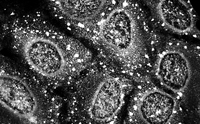|
|
||||
|
Not just another sunshine story Vitamin D could help fight cancer
The voice was calm, despite the devastating news: "I have cancer of the pancreas. Do you know anything about it?" Yes, I did. It's a killer, not something I wanted to tell a friend on the phone. Most people with pancreas cancer only have months to live after the diagnosis. So I was evasive. The next question showed that my friend Annie already knew her situation was desperate: did I know of any new treatments? Yes, again. A London teaching hospital was exploring a new photodynamic treatment for pancreas cancer and having some success. I told her about it but she had already been advised that her tumour was unsuitable for the new treatment because it was too close to a large artery. She probably had even less time than I had thought. But there was another possibility that might provide some hope in an utterly hopeless situation. At the time, I was studying the scientific literature linking chronic disease to insufficient sunlight and vitamin D.
I quickly scanned the literature on pancreas cancer and, yes, there was a clue: in 1998, some Japanese scientists had found a correlation between the number of deaths from pancreas cancer and latitude. People living in countries further north, where there is less sun and vitamin D levels are lower, are more at risk of pancreas cancer. It seemed to follow the same pattern as bowel cancer. If insufficient vitamin D was a cause of pancreas cancer, then perhaps taking vitamin D might do something to stop the cancer, or at least slow it down. But how much vitamin D should a person take? I had no idea. I spoke to Annie a few more times on the telephone and helplessly followed her decline which, as expected, occurred rapidly within a few months. Soon afterwards I heard that a family friend, Mary, a lifelong smoker, had cancer of the lung. The tumour was removed by surgery and her life appeared to return to normal, although she still suffered from backache. In the course of my studies of vitamin D, I had learnt a little-known fact: unexplained backache in old people is frequently caused by insufficient vitamin D. I suggested that she take cod-liver oil capsules, a good source of vitamin D as well as providing friendly fish oils. She tried them but didn't like them. I later learnt that they did not contain enough vitamin D to have made much difference. Mary tried to continue with life as before, but twice she fell while outshopping and, frightened of falling again, she stopped going out except when she was with family and knew she was safe. Muscle weakness, causing falls, is another well-established effect of insufficient vitamin D. By this time, I had found some higher-strength vitamin D in small,tasteless tablets, thus easy to take, but Mary had no confidence that they would make any difference and didn't take them. I thought they might at least improve her general health and, who knows, they might have helped her body to fight the cancer that gradually began to return. Vitamin D for lung cancer - it seems a forlorn hope. We all know that lung cancer is caused by smoking. But scientific evidence emerging in the last few years has shown that insufficient vitamin D is associated with an increased risk of some 18 or more different cancers. And even lung cancer seems to respond to vitamin D. A year ago, Wei Zhou, a researcher working with Dr Edward Giovannucci, Professor of Nutrition and Epidemiology at Harvard School of Public Health, reported that vitamin D seems to aid survival of lung cancer patients. Patients with the highest vitamin D intake who had surgery in summer, when their vitamin D levels were highest, were twice as likely to be alive five years later as patients who had the lowest levels of vitamin D and had surgery in winter. This is just one small study, but similar results have been obtained in Norway and, now, in England, by Professor Henrik Moller, working at the Thames Cancer Registry, of which he is director. So, if I had cancer, or if a friend asked me whether there was anything else he or she could do to improve the chances of living longer, I would say: take vitamin D. It is worth a go. You have nothing to lose. At the very least, it is likely to make you feel a bit better and improve your general health, because three quarters of the UK population have less than optimum levels of the vitamin. And scientific evidence suggests that vitamin D may also help your body to fight the cancer itself. | ||||
Copyright © 2006 Wijeya Newspapers
Ltd. All rights reserved. |
